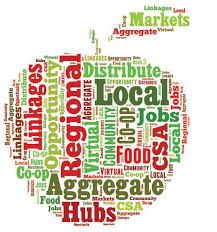Food hubs seen as profitable businesses
A nationwide survey shows that, across the country, food hubs are growing to meet the need for local food distribution infrastructure.
A nationwide survey shows that, across the country, food hubs are growing to meet the need for local food distribution infrastructure. The 2013 National Food Hub Survey was conducted by the Michigan State University Center for Regional Food Systems and the Wallace Center at Winrock International. Michigan State University Extension Community Food Systems educators are affiliates of the MSU Center for Regional Food Systems, and work on initiatives around the state that inform and support local/regional foods.
Food hubs are businesses or organizations that manage the aggregation, distribution and marketing of source-identified food products. The recent survey results from more than 100 food hubs demonstrate that hubs throughout the United States continue to develop as financially viable businesses providing locally produced food to restaurants, schools, grocery stores and other wholesale customers. Food hubs may also provide much needed size-appropriate infrastructure and marketing opportunities for local food produced by small and midsized farms and ranches.
The 2013 National Food Hub Survey represents one of the most comprehensive data sets on food hub operations to date. The survey gathered information on topics such as the financial state of food hubs, the numbers and types of farmers and ranchers that they work with, and the types of customers they serve. Key findings from the survey indicate that food hubs are:
- Financially viable. Sixty-six percent of food hubs operate independently from outside funding sources.
- Contributing significantly to the growth of their local economies. The average food hub’s sales in 2012 exceeded $3.7 million.
- Creating jobs. The average food hub houses 19 paid positions.
- Supporting regional producers. The average food hub worked with 80 producers (i.e., farms and ranches), the majority of which are small or midsized.
- Contributing to food access. Nearly half of all food hubs have operational commitments to equity, increasing food access and/or community development.
“Food hubs are pivotal for meeting the growing demand for regionally produced, healthy food because they offer farmers a profitable channel for reaching wholesale markets, provide valuable aggregation and distribution services otherwise often missing, and efficiently manage relationships and transactions with buyers,” said John Fisk, director of the Wallace Center at Winrock International. “We are excited to see the continued growth and development of food hubs across the country.”
The impact of food hubs has only recently been studied, and information has been lacking on many of the characteristics across a wide range of active food hubs. Through this project, researchers sought to help shape national understanding of food hubs and inform future policy and program initiatives, gain greater exposure for food hubs nationally, and inform potential relationships between food hubs and investors, grant makers and other food hubs seeking success.
“Surveys such as this one provide much needed data for those looking to fund, evaluate and further investigate the role of food hubs in regional food systems. It also provides a way for us to track the change in food hub development over the next decade – we intend to conduct this survey every two years,” said Dr. Michael W. Hamm, C.S. Mott Professor of Sustainable Agriculture and director of the Michigan State University Center for Regional Food Systems.



 Print
Print Email
Email


